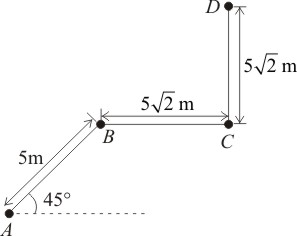A car moves from \(X\) to \(Y\) with a uniform speed \(v_u\) and returns to \(X\) with a uniform speed \(v_d.\) The average speed for this round trip is:
1. \(\frac{2 v_{d} v_{u}}{v_{d} + v_{u}}\)
2. \(\sqrt{v_{u} v_{d}}\)
3. \(\frac{v_{d} v_{u}}{v_{d} + v_{u}}\)
4. \(\frac{v_{u} + v_{d}}{2}\)
1. \(\frac{2 v_{d} v_{u}}{v_{d} + v_{u}}\)
2. \(\sqrt{v_{u} v_{d}}\)
3. \(\frac{v_{d} v_{u}}{v_{d} + v_{u}}\)
4. \(\frac{v_{u} + v_{d}}{2}\)
A particle of unit mass undergoes one-dimensional motion such that its velocity varies according to \(v(x)= βx^{- 2 n}\) where \(\beta\) and \(n\) are constants and \(x\) is the position of the particle. The acceleration of the particle as a function of \(x\) is given by:
1. \(- 2 nβ^{2} x^{- 2 n - 1}\)
2. \(- 2 nβ^{2} x^{- 4 n - 1}\)
3. \(- 2 \beta^{2} x^{- 2 n + 1}\)
4. \(- 2 nβ^{2} x^{- 4 n + 1}\)
If the velocity of a particle is \(v=At+Bt^{2},\) where \(A\) and \(B\) are constants, then the distance travelled by it between \(1~\text{s}\) and \(2~\text{s}\) is:
| 1. | \(3A+7B\) | 2. | \(\frac{3}{2}A+\frac{7}{3}B\) |
| 3. | \(\frac{A}{2}+\frac{B}{3}\) | 4. | \(\frac{3A}{2}+4B\) |
A particle moves along a straight line and its position as a function of time is given by \(x= t^3-3t^2+3t+3\)
| 1. | stops at \(t=1~\text{s}\) and reverses its direction of motion. |
| 2. | stops at \(t= 1~\text{s}\) and continues further without a change of direction. |
| 3. | stops at \(t=2~\text{s}\) and reverses its direction of motion. |
| 4. | stops at \(t=2~\text{s}\) and continues further without a change of direction. |
The coordinate of an object is given as a function of time by \(x = 7 t - 3 t^{2}\), where \(x\) is in metres and \(t\) is in seconds. Its average velocity over the interval \(t=0\) to \(t=4\) is will be:
1. \(5\) m/s
2. \(-5\) m/s
3. \(11\) m/s
4. \(-11\) m/s
The displacement time graph of a moving particle is shown in the figure below. The instantaneous velocity of the particle is negative at the point:
| 1. | D | 2. | F |
| 3. | C | 4. | E |
A particle moves along a path \(ABCD\) as shown in the figure. The magnitude of the displacement of the particle from \(A\) to \(D\) is:

1. m
2. \(10\) m
3. m
4. \(15\) m
A boy standing at the top of a tower of \(20\) m height drops a stone. Assuming \(g=10\) m/s2, the velocity with which it hits the ground will be:
1. \(20\) m/s
2. \(40\) m/s
3. \(5\) m/s
4. \(10\) m/s
Which of the following four statements is false?
| 1. | A body can have zero velocity and still be accelerated. |
| 2. | A body can have a constant velocity and still have a varying speed. |
| 3. | A body can have a constant speed and still have a varying velocity. |
| 4. | The direction of the velocity of a body can change when its acceleration is constant. |
Two cars \(A\) and \(B\) are travelling in the same direction with velocities \(v_1\) and \(v_2\) \((v_1>v_2).\) When the car \(A\) is at a distance \(d\) behind car \(B\), the driver of the car \(A\) applied the brake producing uniform retardation \(a\). There will be no collision when:
1. \(d < \frac{\left( v_{1} - v_{2} \right)^{2}}{2 a}\)
2. \(d < \frac{v_{1}^{2} - v_{2}^{2}}{2 a}\)
3. \(d > \frac{\left(v_{1} - v_{2}\right)^{2}}{2 a}\)
4. \(d > \frac{v_{1}^{2} - v_{2}^{2}}{2 a}\)



